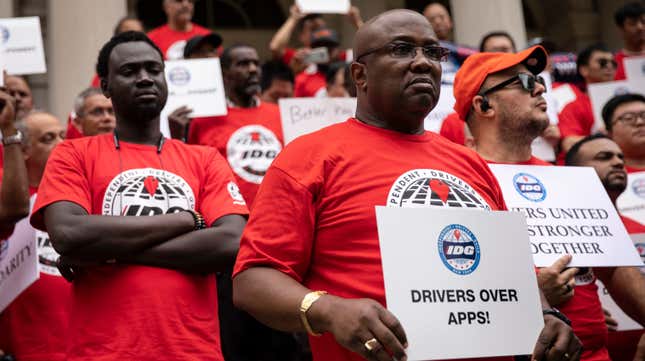
Back in September, California passed AB5, a law that, depending on who you talk to, either clarifies existing labor law to make the definition of an independent contractor clearer or perverts the entire concept of labor law in a gross constitutional violation. The one thing everyone can agree on is AB5, which went into effect on January 1, will have a profound impact on many businesses, most prominently gig economy companies like Uber and Lyft, by making it harder to classify workers as independent contractors.
Uber is not keen on that. Previously, the company has stated its intent to argue in court that, even under the more stringent employee classification the law introduces, Uber drivers are still independent contractors.
“We believe, given all the facts and circumstances...we believe we can make the harder test,” Uber’s chief legal officer Tony West told reporters after the bill’s passage. “We can pass the harder test to the satisfaction of arbitrators and courts who hear the issue.”
Uber may still believe that, but just in case, it has also sued the State of California in federal court along with gig economy app Postmates and two gig economy workers to block the law from taking effect. The plaintiffs argue that AB5 is unconstitutional.
The legal arguments will get sorted out in court, but the lawsuit is perhaps even more noteworthy for the narrative it tells. Not about Uber, but about the country in which it was founded. The suit has a subtle, if unintended, purpose. It is a damning testament to the American way of work, labor, and life.
Quoting a 2016 study by Intuit, the company behind TurboTax and Quickbooks, about gig economy workers, the plaintiffs write:
Such independent service providers like Individual Plaintiffs are able “to integrate work into their existing lifestyles, to manage it along with other work, and to assemble what amounts to a form of income insurance,” thereby gaining the ability “to create their own financial stability.”
That sounds pretty good! But the study they quote had a lot more to say about how the gig economy fits into American society, some of it a lot less flattering [emphasis mine]:
Add it all up, and there is a certain fragility underlying today’s prosperity. Some 41 percent of the people in the survey [of gig economy workers] reported experiencing a financial hardship over the past year, while only 34 percent said their income was more or less stable. About half of the on-demand workers said they were motivated by financial hardship either as a primary reason (19 percent) or as one of several reasons (32 percent) for pursuing on-demand work.
As a result, many people have a desire and both a financial and psychological need to have multiple sources of income. In an era when pensions, unemployment benefits and other social services are changing, many Americans view on-demand work as a way to create their own financial stability.
In short, millions of Americans are turning to app-based gig work because pensions, unemployment benefits, and welfare are so minimal they don’t cover the basic costs of existence.
The gig economy is our country’s replacement for a social safety net. Not just an economic one, but a psychological one. Perhaps one of the saddest statistics for me is that, because unemployment benefits are so meager, one-third of respondents viewed gig economy work as “a backup” in case they lost their regular job.
But Uber takes it a step further. Consider, for example, the fifth paragraph in the suit’s introduction. It is a paragraph about the myriad of people who might avail themselves of gig economy labor, as part of the suit’s exposition for why the gig economy is good for workers, consumers, and the general public as a whole:
For example, Plaintiff Olson uses on-demand work to supplement her primary income while still ensuring she can always care for her husband, who has multiple sclerosis, whenever he needs her. Plaintiff Perez uses on-demand work more regularly to earn a more substantial income than he previously did as a trucker, while still making it to all of his son’s little league games. Other fathers too choose app-based on-demand referrals for the flexibility to work around children’s soccer games or ballet performances. An aspiring comedian might choose to perform transportation services referred through an app so that she can attend an audition without checking with her boss. A student might choose to use a delivery platform for referrals to earn money between classes. A retiree might use an app’s referrals to supplement fixed income and for social interaction. A military spouse might choose to work in the on-demand economy to help ease the burdens of frequent relocation. Others might choose it as a way to supplement “traditional” full-time work or to bridge the gap between salaried positions.2 In short, these independent workers can work as much, or as little, as they want in order to accommodate family, social, professional, academic, and other commitments.
Parents can’t be present for their children, young people can’t pursue their career goals, without literally working for themselves for less money and no benefits. Why? Because it is understood bosses are nearly always assholes, expecting full-time dedication even from part-time wage workers.
A student needs a side hustle because college, both public and private, costs tens of thousands of dollars a year, lunging entire generations into insurmountable debt.
And even if you do manage to get an expensive advanced degree and work for yourself, as Plaintiff Olson does, you need to drive for Uber to make extra money to care for your sick husband because of our obscene, morally repugnant health care system.
Should you live long enough to retire, you’re still not retired, because a retiree needs to work for an app “for social interaction.” In other words, old people living in detached single-family homes often in isolating suburbs that deprive them of regular encounters with other humans, whose children and grandchildren are too busy working themselves to death to spend any time with them, are so damn lonely they drive cabs just to talk to other people.
This is not an argument for why Uber is good. It is an indictment of our society. It is a composite image of American misery, cradle to grave.
Elsewhere in the suit, Uber and its co-plaintiffs assert they have “a constitutional right to pursue the occupation of their choice...” I’ll let the lawyers litigate whether that is truly a constitutional right. Regardless, it’s worth juxtaposing the mere assertion to the rights Americans apparently do not have: to not be plunged into debt by a sick relative, to an affordable education, to work a full-time job and spend time with one’s children.
If those were also rights, then perhaps Uber’s business would fail not because of an “incoherent statute” that may make them classify workers differently, but for want of low-wage contractors who, instead of filling the gaps in their lives with a $30 billion app, find their lives sustainable and fulfilling without it.
